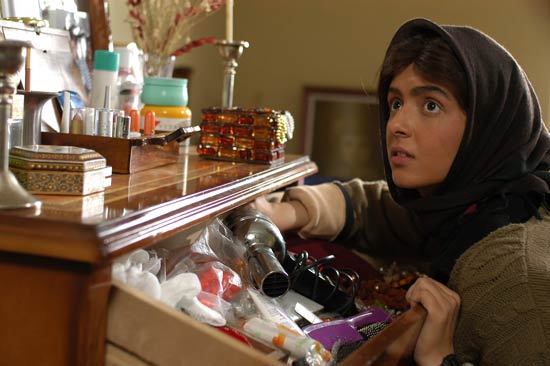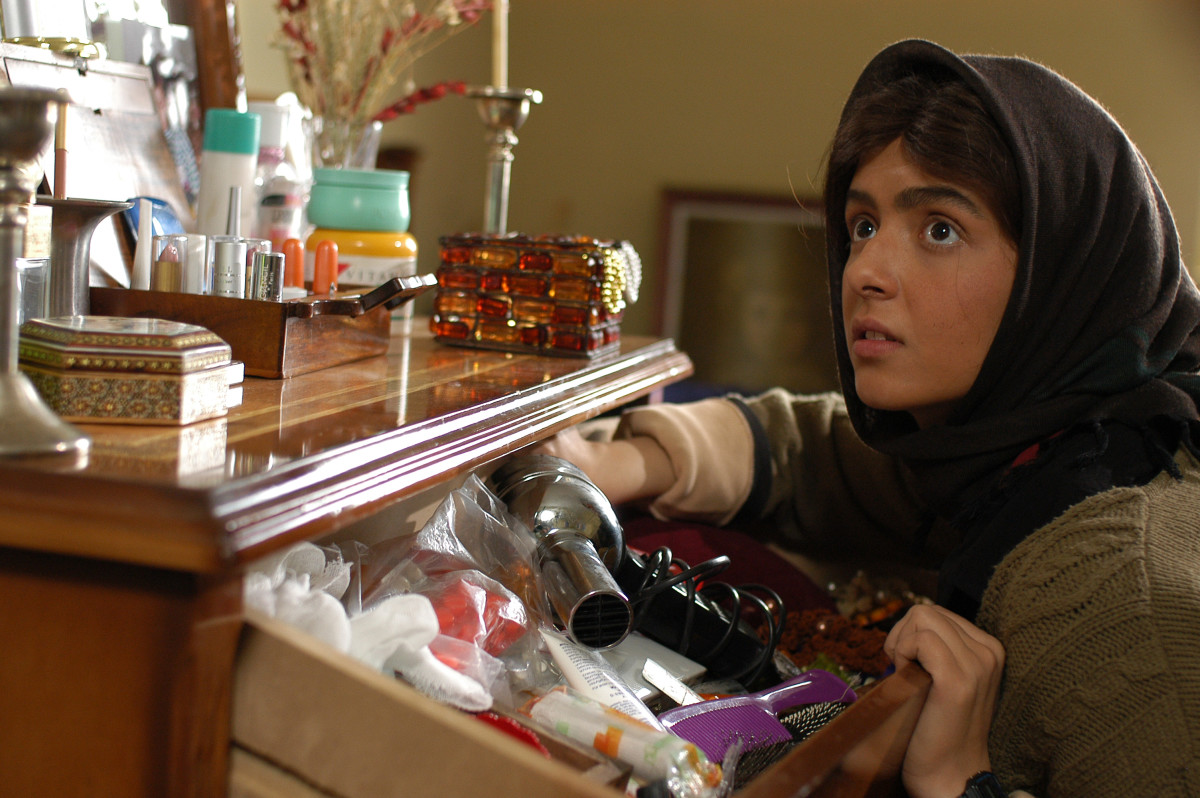
In 2011, a little-known Iranian filmmaker named Asghar Farhadi became something of an international sensation when his domestic drama, A Separation, won a Golden Globe, an Oscar, and more than sixty other awards within a span of months. The film’s critical acclaim owed largely to the fact that it was made by an auteur. Indeed A Separation was that very rare thing: a film with a unified moral and stylistic vision, and one that seemed to arrive out of nowhere. It’s commercial success led to an interest in Farhadi’s back catalogue. For by then he had already been writing and directing in Iran for seven years. These older films, rather like Roberto Bolaño’s fiction, have since been appearing in the western world in reverse order of chronology.
While Hollywood traffics in clear-cut heroes and villains, Farhadi’s characters are unknowably (and, as the films unfold, increasingly) many-sided.
Fireworks Wednesdays, which debuted at New York’s Film Forum last week, is Farhadi’s latest film to make its way to the US. Originally released in 2006, it is also the oldest of his major films. As a director, Farhadi has been working with the same set of themes (more on this later) throughout his career.
Fireworks gives us an opportunity to understand his younger, rawer self.
Farhadi makes thrilling films. Given their countless twists and revelations, I’m even tempted to call them thrillers. But the truth—a loaded term, when speaking of his work—is that Farhadi’s intentions are diametrically opposed to Hollywood’s. While conventional thrillers arrow towards their climax, Farhadi’s plots are widening gyres: they grow out, and often away from, a climactic event that occurs rather early on. While Hollywood traffics in clear-cut heroes and villains, Farhadi’s characters are unknowably (and, as the films unfold, increasingly) many-sided. Finally, and perhaps most importantly, Hollywood and Farhadi have different attitudes about reality.
In Hollywood, the objective truth is what counts: revelations are supposed to confirm—or transform—our understanding of everything that has led up to it. Farhadi’s films, however, operate like palimpsests. New evidence often negates our interpretations of past events and our opinion of characters. But these now-defunct interpretations and opinions linger; they are never entirely erased. Indeed, as the revelations emerge one after the other, we realize that Farhadi is less concerned with ‘what really happened’ and more with how his characters react given that they believe such and such happened. We spend so much of life not knowing, his films suggest, that conjecture is its own form of reality.
One example of this occurs in Farhadi’s 2009 film, About Elly, when the film’s title character goes missing, and each character has a different theory about what happened. Elly is spending the weekend at a beachfront villa on the Caspian Sea. She is the sole outsider amongst what is otherwise a tightly knit group of old college friends—three married couples, their toddlers, and one divorcee. The group quickly grows fond of her, however, and she’s even trusted with the task of taking a toddler to play in the water. It’s a horrific shock, then, when the adults arrive at the shore to find the toddler drowning (he is eventually saved) and also to find Elly missing.
He has numerous thematic obsessions—the clash of tradition and modernity in Iran, the relations between the country’s upper and lower classes, the infeasibility of marriage, institutional misogyny, religion—that develop across his oeuvre.
Has she drowned in an attempt to rescue the boy? Has she fled in shock at her oversight? Who entrusted the toddler in her care? Didn’t she seem distrustful? Hadn’t she wanted to leave the previous night? Why was she invited on the vacation in the first place? As new facts about Elly’s identity emerge (her real name isn’t Elly; she is hiding from her fiancé) the group members’ take on her disappearance oscillates. Disagreements break out, and soon couples are fighting with one another. Fractures in their own relationships and friendships are revealed. Elly’s body washes up on shore at the film’s conclusion, but its appearance is little more than an empty vindication for those who stood by her. For by then her death almost feels incidental to the subsequent issues it has raised.
2011’s A Separation and 2013’s The Past are domestic intrigues framed by similarly mysterious events. In A Separation, the otherwise amicable divorce proceedings of an upper-middle-class Tehrani couple is derailed when the man is accused of assaulting his pregnant maid. In The Past, Samir and Marie’s marriage plans are put on hold when new details regarding the attempted suicide of the former’s ex-wife emerge.
Watching Farhadi’s films in chronological order, as I have this past week, is a fascinating experience for many reasons. He has numerous thematic obsessions—the clash of tradition and modernity in Iran, the relations between the country’s upper and lower classes, the infeasibility of marriage, institutional misogyny, religion—that develop across his oeuvre. He also has his favorite set pieces: the otherwise decent man who assaults a woman, the innocent children who see through the adults. And since Farhadi tends to recast the same actors, one also delights in watching them grow older with his films.
Peymann Moadi, for example, grows from playing a rakish young husband in About Elly, to playing a somber, middle-aged divorcee in A Separation. Shahab Hosseini is a young, hopeful ex-pat in About Elly, and a depressed, debt-ridden cobbler in A Separation. And Taraneh Alidoosti, the titular character of About Elly re-emerges as Rouhi, one of the female protagonists of Fireworks Wednesdays, a film that tells the story of two Tehrani couples at very different stages of their relationships.
Fireworks Wednesday opens with an economic interaction that is most emblematic of class-relations in the developing world: the hiring of a maid. Mozdhe and Mortaza, an upper-middle-class couple, need help cleaning their large apartment in northern Tehran. Through a service, they hire Rouhi, who comes from a poor neighborhood outside the city. What complicates this otherwise common phenomenon is the fact that Mozdhe and Mortaza’s marriage is coming apart. Mozdhe suspects that Mortaza is having an affair with their neighbor Simrin, who has herself recently emerged from a divorce. They have been fighting over it for a few days now. Rouhi, by contrast, will soon be getting married to a man she’s happily in love with.
But can love survive marriage? And is there happiness to be had for a married woman in Iran? These are the questions that haunt Rouhi as she comes to learn about Mozdhe and Mortaza’s marriage over the course of a day.
But there is a double enquiry in motion here. As Rouhi is trying to decipher the truth behind Mozdhe and Mortaza’s relationship, we, as viewers, are trying to figure out what’s happening in Rouhi’s head. This proves to be a rather difficult task.
James Wood has written that Frédéric Moreau, the protagonist of Flaubert’s Sentimental Education, is “a frustratingly malleable figure, a hero almost vacuous except for the exactitude of her noticing.” The same can be said about Rouhi. Save for a few traits—her cheerfulness, her romantic dreams—we end the film knowing almost nothing about her, even though she’s the character who occupies the most time on screen. This is partly a consequence of the film’s realism. Rouhi spends a majority of the film in Mortaza and Mozdhe’s house, and as a lowly maid, she can’t interfere much with what happens there. But it’s also a result of Farhadi framing her, rather cunningly, as an innocent provincial who is learning how to live from the other urban characters.
Rouhi expresses certain instinctive sympathies towards certain characters, and instinctive antipathies towards others. But these are at best fleeting gestures.
Indeed Rouhi’s similarity with Moreau is not circumstantial. Farhadi has explicitly framed experiences at an upper class apartment as a sort of sped-up sentimental education. Seeing Mozdhe trapped in a domestic prison of fancy glassware, furniture and children, Rouhi understands how resentment can build up when one is denied the right to work. In Mortaza, she sees the ease with which men transform from caring and understanding husbands, to stubborn and indecent pigs. From Simrin she learns about the prejudices that single women must suffer. Rouhi, however, teaches these characters nothing in return. She can’t, because she reveals so little of her inner self. Her sole task as a character is to observe and learn. As such, she’s not unlike the viewer. The only difference being that she’s on screen.
So what are we to make of this innocent, provincial and passive protagonist?
It can be argued that Farhadi has failed to imagine his way into a lower-class character. That he is calling our attention to Rouhi’s class precisely because he’s failed to give her a personality.
The easy response to this is that Farhadi is making a useful social contribution just by depicting a marginal group, by making us look at and think about a maid for two continuous hours. A large part of class prejudice is after all a result of our indifference towards the lives and indeed presence of those who clean up after us (in our homes, at our workplace, on the streets). Farhadi himself shows how Mozdhe and Mortaza openly discuss personal matters in Rouhi’s presence. They talk as if she isn’t there.
But I believe that Farhadi is making a deeper point. Like his other films, Fireworks proceeds in a series of accusations, prevarications, and discoveries that each tugs our sympathy in a different direction. Given that Rouhi is caught in the midst of these events, we are desperate to know what she makes of things. But we are never told this. Rouhi expresses certain instinctive sympathies towards certain characters, and instinctive antipathies towards others. But these are at best fleeting gestures. In the final verdict, we—like the film’s other characters—are left in the dark about her thoughts. Which is to say we find ourselves flapping in the realm of conjecture.
It is in this way that Farhadi turns the camera around and points it toward the viewer. We go about our lives, he is saying, knowing next to nothing of the experience of a whole class of people. But it’s only when they appear on a screen that we even take note of this ignorance.
